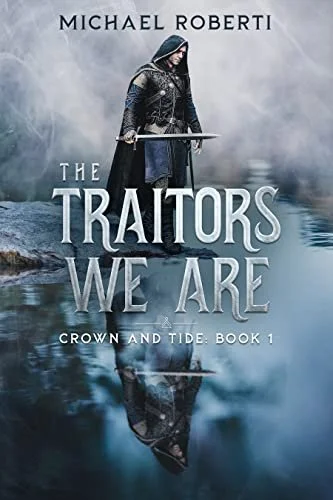Book Review - The Traitors We Are by Michael Roberti
Few books have a more exciting premise than Michael Roberti’s The Traitors We Are. In a fantasy world where penned writing disappears the moment the author dies, in wartime, history truly is written by the victors.
The Traitors We Are is split into two halves, both making for effortless reading. The first half is premium cut military fantasy with a strong eye for action and grizzled characters. The second half is a much more subtle political conflict with lots of moving parts and intrigue. Beyond showcasing Roberti’s talent for writing in both styles, I was even more impressed by how well he managed the transition from one to the other. It was a bold narrative choice, and one that not every author would have been able to pull off.
While I initially found the world-building to be a bit hazy, these complaints slowly vanished as I got further into the book, until eventually it became one of my favourite aspects of the story. It was incredible getting to build familiarity with the different cultures represented in this book, especially as it pertained to the Reachmen. Seeing characters play out traditions such as drinking from each other's cups, or speaking ill of the recently deceased, added so much detail to the world that didn’t have to be there, but was made so much better for it.
And because Michael Roberti handles the broad scale issues in his book so well, his characters have so much more room to shine as a result. There’s nuance and depth to certain characters that only really came out because of the work previously done by the world-building. Cael, Merily, Erik and Freia – these are names that you will come to appreciate and love thanks to the strong voice in Roberti’s dialogue, but it is Emil who tops the list of my personal favourites. He’s exactly the kind of character that I love seeing in fantasy; foolish, arrogant and impressionable, but with an innate ability to reflect upon his actions and outgrow his flaws. I simply can’t wait to see where these characters go in the stories to come.
I did have a few gripes with this book however. The writing picked up a bad habit of switching scenes and including flashbacks without using a paragraph break, which always gave my brain a good ol’ whack of “Wait, what just happened? Where are we now?” that was entirely avoidable with better formatting. I also found that exposition was poorly placed at times, including one particularly egregious example whereby a character, immediately after hearing the worst news of their life, breaks into an internal monologue explaining character relationships to the reader, rather than acknowledging the raw emotions of the scene.
While this book does have flaws, it is still a thoroughly entertaining read. My thoughts as I was nearing the end consisted mainly of “Wait, it can’t be ending so soon!” and given how inundated the fantasy genre is with overly long fantasy books, I consider it a blessing that my main complaint is only “I want more!”. I wish Michael Roberti the best of luck in SPFBO 9, but frankly, I’m not sure he even needs it.


